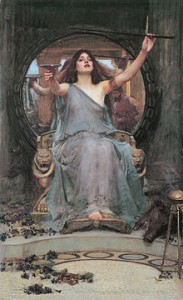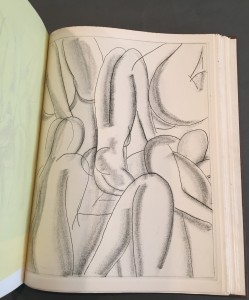ULYSSES readalong: Bk 15 part 2, “Circe”

Welcome back, you few, you happy few, who are still brave enough to continue with Joyce’s oh-so-challenging Ulysses. This week finds us in the mucky middle of book 15, Circe. Oh, what a long, strange trip it is.
I picked the section that begins with Zoe saying “Talk away till you’re black in the face,” which is an interesting twist on the “blue” we’re more accustomed to. Blue indicates lack of oxygen, while black points to death. Bloom has a short interlude of lucidity with Zoe, but he goes in and out of fantasy. I could tell what was fantasy and what not mostly but not always by when the “real” people in the room spoke, rather than the objects, such as Lynch’s cap, Zoe’s buckles and Bella’s fan; or imaginary people, such as Virag (Bloom’s grandfather), and others.
An extended and jaw-dropping (and likely censor-enraging) dream sequence begins when the madame, Bella Cohen enters and says “My word, I’m all of a mucksweat.” Everything from there till when she asks “Which of you was playing the dead march from Saul?” is Bloom’s imagination, his subconscious and secret thoughts dragged out of the dark and brought to life.
To briefly summarize, Bloom and Bella switch roles. She becomes a man named Bello, he a woman referred to still as Bloom but with feminine pronouns. Bello, like Circe did to Odysseus’ men, makes Bloom piglike and alludes to many porcine things. In an inversion of the play Venus in Furs by Leopold von Sacher-Masoch, many of the things Bello as a man does to Bloom as a woman echo those that Wanda does to Severin. I was fortunate to see a modern retelling, Venus in Fur, a few years ago, so I recognize the references.
Bello rides Bloom as a horse, which the other prostitutes clamor to do also. Bello puts out a lit cigar on her ear, and auctions her off to other men, after this: “[Bello] bares his arm and plunges it elbowdeep in Bloom’s vulva.”
For the record, Joyce got his words mixed up. Vulva refers to all of woman’s external genitalia such as the labiae and the clitoris, south of the pubic bone. North of it, with the hair, is the mons. The reproductive canal is the vagina, which is what Bello plunges his arm into up to the elbow. This is not, as schmoop notes in its summary of 15: Circe, the same as “Bello elbows Bloom in the vulva.”
The above terminology, and the importance of using it correctly, is from one of my new favorite books, which I’ve found not surprisingly often relevant to this reading of Ulysses, Come As You Are: The Surprising New Science That Will Transform Your Sex Life by Emily Nagoski. The subtitle of the book is probably more for getting attention. I find the website’s description a better one: “An essential exploration of why and how women’s sexuality works–based on groundbreaking research and brain science.” Poldy and Molly could really have used this book. So could Joyce. Here’s Matisse’s take on the anatomy in Chapter 15, Circe:

Back to Ulysses. Bloom gradually returns to a state of masculinity and Bello to Bella. Reality is again broached when Bella asks about the piano.
You can visit the summary at Schmoop.com and the analysis if that helps. Again, they’re not precise, but I do find them broadly helpful.
Did anyone else see Venus in Fur when it was in Minneapolis? Excerpt video here, and review here.
What did you think of this part of chapter 15?
Let’s meet here next Monday 5/18/15 to discuss the last part of chapter 15, and the chapter as a whole.
Apologies for this week’s late post. I visited my parents this weekend with my sister to help them clear out the house while they’re still alive and well, which I wrote about here. I highly recommend doing this, both getting together with the nuclear family, and going through things before one has to. We’ve all been influenced by one of my other recent favorite books, Marie Kondo’s The Life-Changing Magic of Tidying Up. Too see a video where she helps a woman sort her books, go to this link at Boing Boing.
Blogging about it on Monday was perhaps an ambitious goal. I’ll adjust the schedule to Wednesday, I think, when we read David Foster Wallace’s Infinite Jest this summer.
Future schedule and past posts:
5/18/15 discuss and tweet 3475-end, and all of section 15
5/25/15 discuss and tweet section 16
(extra week to read the longer section 17)
6/8/15 read then discuss and tweet section 17
6/15/15 discuss and tweet section 18
6/16/15 Bloomsday!
Past posts:
Week 1: books 1 and 2
Week 2: books 3 and 4
Week 3: books 5, 6
Week 4: book 7
Week 5: book 8
Week 6: book 9
Week 7: book 10
Week 8: book 11
Week 9: book 12
Week 10: book 13
Week 11: book 14
Week 12: book 15 part 1/3
May 12th, 2015 at 11:17 am
I interpreted it as Bloom imagining himself being punished/raped by the devil because of his struggle with his own sins or hedonism/fear of acting as a heathen. Â What a wild ride it was. Â Highbrow porn.
Still continued to be fixated on the aspects of different religions in the battle going on in Bloom’s brain. Â particularly Zoarastrianism. Â The name Virag I am sure has come up in looking into the ancient religion. Â (Will try to dig up something and maybe post again.)
Also I think the Ash plant is a reference to the Druids and the tree of life and also knowledge. Â It is acting like a wand that conjures truth seeing dreams/hallucinations.
May 12th, 2015 at 11:20 am
Ash was also the name AS Byatt chose for the male in Possession.
May 12th, 2015 at 11:52 am
Just prior to our section 2 there’s a reference to “the new womanly man”. [ML 1946, p. 483]. I feel that what we’re dealing with here is product of both Leopold Bloom’s troubled conscience and his continued awkward journey of empathy towards the women in his life. That ultimate gender switch (Bella/Bello) and humiliation seems in keeping with what his poisoned hallucinating subconscious would lead to.
The sentient objects & concepts (cap, gramophone, gasjet, flybill, doorhandle, fan, sins of the past, etc.) continue to fascinate and amuse me. They very much add to the hallucinatory mood. Also the dialogue between Stephen’s drunken conscience in the form of “Philip Drunk and Philip Sober”.
There’s a poignant statement from Bloom in the midst of all the S-M fantasy which made my heart catch. Yes, I continue to feel quite tender-hearted about Leopold Bloom.
“I am exhausted, abandoned, no more young. I stand, so to speak, with an unposted letter bearing the extra regulation fee before the too late box of the general postoffice of human life.” [ML 1946, p.516]
May 12th, 2015 at 1:18 pm
That rocks my world; I love that book. And you get 100% credit for my having read it. Hence, you, rock my world.
I found a few VERY vague references to the name Virag in some books on ancient religions but know that this post will become more convoluted than a passage out of Ulysses (ba-dum-bum). So I refrain.
May 12th, 2015 at 1:29 pm
Heidi, I too love that passage of Bloom’s and may put it in an edited version of the post. I doubt I would have felt nearly so strongly for Bloom had I read this in college, as opposed to in midlife.
May 12th, 2015 at 1:35 pm
That quote from Bloom was definitely a tear-jerker.
May 13th, 2015 at 7:06 am
Kiki, you’re completely right. I too would’ve judged Poldy more harshly in my younger days. From the mid-life perspective there’s often all too much to empathize with.
Crystal, you’ve been adding such insightful commentary to our discussion! Do hope we will see you on Bloomsday. If not, please be in touch with a mailing address so we can send you your well-earned Bookscouts badge!
May 13th, 2015 at 8:46 am
Crystal, also note how the ash is always used phallicly by Stephen or Lynch–it’s like an extension for them. Heidi, one of the ongoing themes seems to be Bloom’s womanly man, and I’ll have to look up when Jung’s work on anima/animus was published, and whether it was an influence on Joyce. I don’t recall that Gifford has mentioned it in the Annotated Ulysses.
Heidi, Crystal darn well better be joining us for Bloomsday, but if not, I’ll get the badge to her–we’re neighbors and bus stop moms and friends and Gods and Monsterites.
I wonder if I would have found Stephen so insufferable if I’d read when I were younger?
May 15th, 2015 at 9:25 am
I think that you have something there with Jung. And other poets of the time. I think that Joyce has included much of his boys club ruminescings as possible. Would be curious who all he hung with and imaging them hanging out together in the library talking “Shakespeare”/philosophy. Look forward to do the same Bloomsday.
May 16th, 2015 at 1:18 pm
Anyone else catch that The Nymph (accompanied by her Yews and Waterfall) is from the art reproduction “Bath of the Nymph,” from the Easter number of “Photo Bits”, that hangs, nicely framed, above Molly and Leopold’s bed? [Ep. 4: Calypso, ML 1946, pp.64-65]. What has she not seen in that chamber indeed.
May 17th, 2015 at 1:33 pm
Mucky middle indeed!
Most of this middling section felt hallucigenic to me. It seems like the lucid moments are primarily when he is talking to Zoe?
I have not much else to say, so here’s my favorite quote from the section:
“Death is the highest form of life.” (504)
May 17th, 2015 at 9:36 pm
Missed that! Love all these “Easter eggs” of art and poetry. *btw, the feeling is mutual*
May 18th, 2015 at 12:01 am
Just catching up on this. So a little less than a week behind now. Yeah, might need a night to absorb and compare and contrast with “Venus In Fur,” which I saw at the Jungle. A film version was later made. By Roman Polanski. I shite you not.